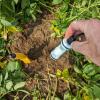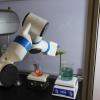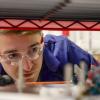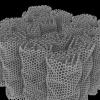Materials Science Engineering
 Thad Sauvain (ChemEngr’91) recently established a legacy endowment in his estate plan to support undergraduate scholarships for CU Boulder chemical and mechanical engineering majors, with preference for those who demonstrate a commitment to the LGBTQ+ community. Sauvain credits his own time at CU Boulder, where he earned a BS in chemical engineering, with helping him thrive both as an engineer and as a gay individual.
Thad Sauvain (ChemEngr’91) recently established a legacy endowment in his estate plan to support undergraduate scholarships for CU Boulder chemical and mechanical engineering majors, with preference for those who demonstrate a commitment to the LGBTQ+ community. Sauvain credits his own time at CU Boulder, where he earned a BS in chemical engineering, with helping him thrive both as an engineer and as a gay individual. Soil is comprised of an intricate network of bacteria and other microbes that humans depend on, but this complex environmental system is constantly shifting, making it difficult for scientists to measure. Associate Professor Gregory Whiting and his team of researchers are developing reliable, inexpensive and easy-to-deploy sensors that monitor soil in real time to help farmers optimize their use of fertilizers, reduce greenhouse gas emissions and save money in the process.
Soil is comprised of an intricate network of bacteria and other microbes that humans depend on, but this complex environmental system is constantly shifting, making it difficult for scientists to measure. Associate Professor Gregory Whiting and his team of researchers are developing reliable, inexpensive and easy-to-deploy sensors that monitor soil in real time to help farmers optimize their use of fertilizers, reduce greenhouse gas emissions and save money in the process. Adam Harris is advancing the frontiers of aerodynamics as a non-traditional student, finishing up a doctoral program in which he never expected to enroll. “I’m writing computational fluid dynamics and finite element codes to study flow control
Adam Harris is advancing the frontiers of aerodynamics as a non-traditional student, finishing up a doctoral program in which he never expected to enroll. “I’m writing computational fluid dynamics and finite element codes to study flow control A CU Boulder research team co-led by Distinguished Professor Christopher Bowman has received up to $5.8 million from ARPA-H to develop new treatments that temporarily suspend the immune response after severe burns or tissue injuries, aiming to reduce pain, speed healing and prevent long-term damage. The approach could also benefit patients with limited access to immediate medical care.
A CU Boulder research team co-led by Distinguished Professor Christopher Bowman has received up to $5.8 million from ARPA-H to develop new treatments that temporarily suspend the immune response after severe burns or tissue injuries, aiming to reduce pain, speed healing and prevent long-term damage. The approach could also benefit patients with limited access to immediate medical care. Adding to a growing list of honors, Assistant Professor Ankur Gupta has been awarded the Royal Society of Chemistry’s 2025 Soft Matter Lectureship — a prestigious recognition of outstanding early-career researchers in the field.
Adding to a growing list of honors, Assistant Professor Ankur Gupta has been awarded the Royal Society of Chemistry’s 2025 Soft Matter Lectureship — a prestigious recognition of outstanding early-career researchers in the field. Distinguished Professor Kristi Anseth, of chemical and biological engineering, designs biomaterials that interact with living tissues to promote repair and regeneration, aiding in healing injuries and diseases. Her lab works with hydrogels—a degradable biomaterial—to deliver molecules at the right time and sequence to accelerate the healing process.
Distinguished Professor Kristi Anseth, of chemical and biological engineering, designs biomaterials that interact with living tissues to promote repair and regeneration, aiding in healing injuries and diseases. Her lab works with hydrogels—a degradable biomaterial—to deliver molecules at the right time and sequence to accelerate the healing process. Co-organized by Professor Mike Toney, the 2025 Front Range Electrochemistry Workshop (FREW) broadly addressed electrochemical science, with this year’s focus on batteries reflecting their growing importance to everything from electric vehicles to renewable energy infrastructure.
Co-organized by Professor Mike Toney, the 2025 Front Range Electrochemistry Workshop (FREW) broadly addressed electrochemical science, with this year’s focus on batteries reflecting their growing importance to everything from electric vehicles to renewable energy infrastructure. Assistant Professor Carson Bruns is leading the charge on an NSF-funded project that he and his team like to call "robochemistry." Their goal is to create robotic sidekicks that can assist chemists with burdensome or unsafe tasks that they may routinely encounter in a wet lab. But that's not all: this unique blend of bots and beakers can also inspire youth interest in science.
Assistant Professor Carson Bruns is leading the charge on an NSF-funded project that he and his team like to call "robochemistry." Their goal is to create robotic sidekicks that can assist chemists with burdensome or unsafe tasks that they may routinely encounter in a wet lab. But that's not all: this unique blend of bots and beakers can also inspire youth interest in science. Alumni founders from Mana Battery and Manifest Technologies talk about why they chose CU Engineering as the place to launch their startup.
Alumni founders from Mana Battery and Manifest Technologies talk about why they chose CU Engineering as the place to launch their startup. Materials researchers are getting a big boost from a new database created by a team of researchers led by Professor Hendrik Heinz. The initiative, now available online to all researchers, is a database containing over 2,000 carbon nanotube stress-strain curves and failure properties.
Materials researchers are getting a big boost from a new database created by a team of researchers led by Professor Hendrik Heinz. The initiative, now available online to all researchers, is a database containing over 2,000 carbon nanotube stress-strain curves and failure properties.

